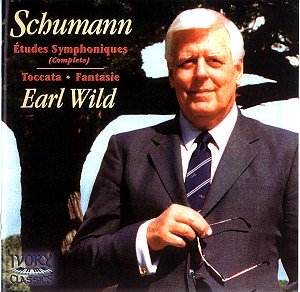Not much to say about most of this except that itís
just marvellous! Earl Wild has been known to us for decades as technically
one of the finest-equipped pianists around, with maybe a suspicion that
he was at his best unravelling impossibly complicated works of the old
virtuoso school, tossing them off with a rare abandon, rather than as
a profound interpreter of the basic classics. The confident, up-front
but rather noisy performance of the Toccata from a live concert in London
might seem to bear this out, though this is a difficult piece to humanise.
The 1990 studio recordings suggest that, if the suspicion was ever founded,
old age has brought a mellowing and a deepening without any loss of
technical armoury.
Most remarkable of all is the Fantaisie. Wild knows
when to surge forward, when to relax, when to melt and dream. His basic
tempo in the first movement may seem fast, but it is very close to Schumannís
own markings, and the way in which Wild manages to breathe in this tempo,
to drift away from it and then come to it without losing sight of the
overall structure is sheer mastery. Sheer mastery of another kind is
to be heard in his ability to clarify the most teeming textures and
to produce a sound that is always rounded and singing in the heaviest
passages. The second movement is properly exuberant (no heavy-footed
march, this) and the steadily growing fires of the finale are expressed
with much poetry. This performance goes straight among the elite.
The inclusion of the five posthumous variations (which
Schumann himself removed) in the Etudes Symphoniques is theoretically
not such a brilliant idea since they are more conventional in style
than those of the "approved" version which is therefore stronger.
But anything written by Schumann is surely worth knowing and they could
not find a better advocate. Wild is the master of every mood, from mercurial
to passionate, from stormy to inwardly romantic.
With recordings worthy of the occasion, this is essential
for all who love the piano, Schumann or both.
Christopher Howell
